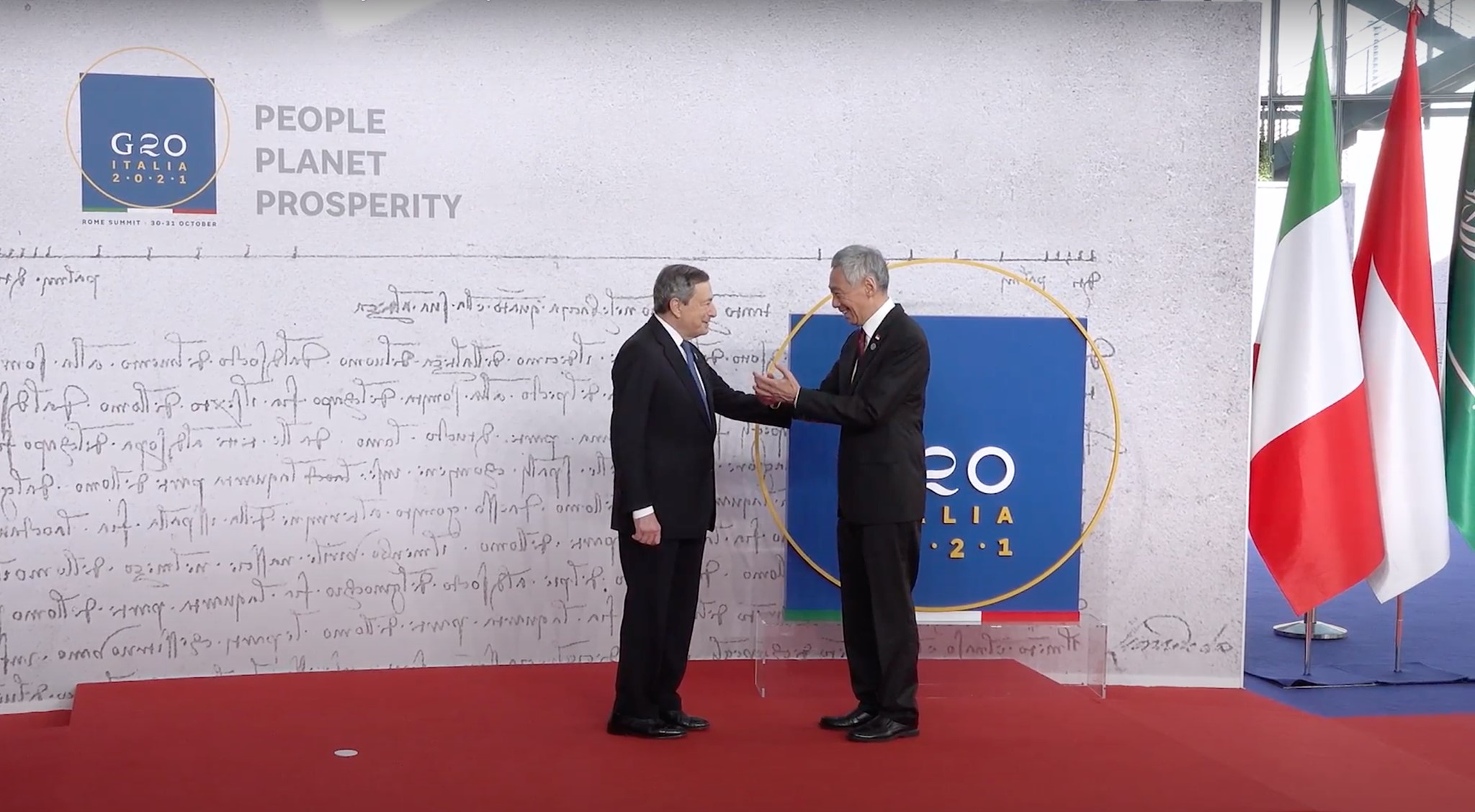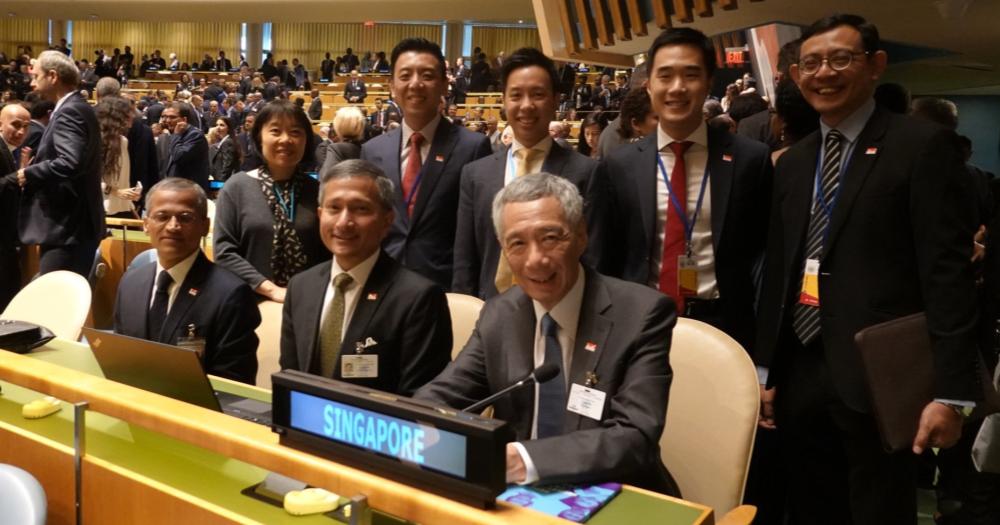Prime Minister Lee Hsien Loong's foreign policy can be distilled into two forms. The first is a clear bilateral approach, which puts relationships with other countries and their leaders at the heart of Singaporean diplomacy.
The second is a focus on global, multilateral institutions — organisations that allow many countries to work together, such as Asean, the United Nations, and the International Court of Justice.
As PM Lee said in his final May Day Rally, Singapore at international forums does its “part and strives to be a constructive and reliable player and we have built up a reputation.”
“Singaporean ministers and officials, they know their stuff and make a contribution. This is how a small country can make friends, advance our interests and stand tall."
This approach does not originate with PM Lee, it is not a concept that he introduced. The exploits of Singapore's early foreign ministry could fill a book, and has.
But he has been a custodian of the tradition, expanding upon it to maximise Singapore's foreign policy regionally and internationally, particularly at a time when the global rules-based order has felt like it first peaked, then has gone into retreat.
Standing out
During PM Lee's tenure, Singapore has had to stand out from the mass of small countries to reiterate its firm belief in international law and the expansion of global free trade.
Whether it was the only country in Southeast Asia to unilaterally condemn and sanction Russia for its invasion of Ukraine or stridently advocating for international trade deals such as the Trans-Pacific Partnership, Singapore and PM Lee have been at the forefront of defending Singapore's interests.
But it has done so by involving other countries, showing that protecting Singapore's national interest is not a selfish, zero-sum game, but actively participating in multilateral forums and organisations, from the United Nations to the Global Governance Group to Asean and more.
The United Nations, the Global Governance Group, and the G20
The United Nations has always played an important role in Singaporean foreign policy.
PM Lee himself spoke at the general assembly in 2019, and during his time as prime minister, Singapore has been very active in the organisation.
 Image via Betty Chua/MCI[/caption]
Image via Betty Chua/MCI[/caption]
Sometimes, it involves seconding Singaporeans to UN institutions, in order to contribute to meaningful and important initiatives.
One such example is that of the ambassador Rena Lee, who recently presided over negotiations for the Marine Biological Diversity of Areas Beyond National Jurisdiction (BBNJ) agreement that was passed at the end of 2023, whom PM Lee cited in his 2023 speech thanking the President in parliament.
Ambassador Lee has been credited with being vital to the successful conclusion of the agreement, even being named in Time Magazine's list of the 100 most influential people for 2024.
Singapore's participation in the UN has led to other notable achievements, such as the introduction of the Singapore Convention on Mediation, which provides a uniform framework for the "enforcement and invocation of international settlement agreements resulting from mediation".
It was passed in 2018 by the UN General Assembly but reflects work done from 2014 and earlier.
3G coverage
But it also takes the form of participating in smaller subgroups involving other United Nations members.
Two such groupings are the Forum of Small States (FOSS), and the Global Governance Group otherwise known as 3G.
Participating in these groups ensures that small countries such as Singapore, by speaking together, can speak up and be heard where they might be individually ignored.
This approach has borne fruit in other ways as well.
The 3G was set up in 2009 as an informal grouping of 30 small and medium-sized members of the United Nations in order to encourage stronger dialogue and linkages with the Group of 20 (G20) nations, an approach that has consistently allowed it more access than might otherwise be achieved.
G20
PM Lee has thus been able to be an active and regular participant in the G20 meetings since 2010.
The G20 is a grouping of 19 countries as well as the European Union, such as the United States, India, Japan, Indonesia, Brazil, and Russia.
Singapore is not part of the G20, but as the convener of the 3G, it has been invited to attend G20 meetings from 2010 onwards, with the exception of 2012.
 Image via PMO
Image via PMO
PM Lee attended his last G20 in New Delhi in India in 2023, but Singapore has been invited to attend again by Brazil, 2024’s G20 chair.
Singapore's participation goes beyond just the PM and the cabinet, extending to other notables such as Speaker for Parliament Seah Kian Peng, who attended the 2023 G20 Parliamentary Speakers’ Summit in New Delhi, India.
Singapore's G20 experience is a metaphor for Singapore's multilateral foreign relations: able to approach the top table because of the value it brings to countries both large and small, but always subject to maintaining its relevance.
CPTPP and RCEP
Another cornerstone of Singapore's multilateral diplomacy under PM Lee has been its focus on multilateral trade agreements.
While this approach did not begin under PM Lee’s tenure, under his tenure, Singapore has become party to two of the world’s largest multilateral trade agreements, the Comprehensive and Progressive Agreement for Trans-Pacific Partnership (CPTPP), and the Regional Comprehensive Economic Partnership (RCEP).
The CPTPP has its origins in a four-country trade agreement, catchily named the Trans-Pacific Strategic Economic Partnership Agreement, between New Zealand, Brunei, and Chile.
This formed the foundation of the agreement that would eventually become the Trans-Pacific Partnership.
By 2016, significant progress had been made on the TPP agreement, but with both United States presidential candidates rejecting it, it looked unlikely to come into effect despite the pleas of then-President Barack Obama.
PM Lee engaged Western and U.S. media with a strident defence of multilateral trade and TPP, most notably in an interview with Time magazine.
As part of his defence of the trading pact, he said that trade was an extension of a country’s foreign policy and showed that the countries involved had a stake in the region beyond just military interest.
The CPTPP was also explained in parliament in 2018 by then Trade and Industry Minister Chan Chun Sing, who said:
"The CPTPP also establishes a common set of enforceable rules that address modern trade and investment issues."
It was in this vein that Singapore helped shepherd the RCEP agreement into existence, along with other Asean states.
[caption id="" align="alignnone" width="2051"] Image via Betty Chua/MCI[/caption]
Image via Betty Chua/MCI[/caption]
The RCEP was a consolidation of several trading agreements between the Asean and partner countries such as Australia, China, Japan, South Korea, New Zealand, and India.
Ultimately, India would not sign the RCEP, but the remaining countries who did would form the largest global trading block by population.
Both trade deals show Singapore's commitment to free trade, and also the maintenance of a global rules-based order. As PM Lee said in parliament in 2023:
"We rely on the free flow of trade and investments across the world, and a common set of rules that applies to all countries, no matter their size."
Asean
The signing of RCEP, as pertains to Singapore's foreign policy, also shows the centrality of Asean in the foreign policy of PM Lee’s government.
During his time as prime minister, Singapore has chaired Asean twice, once in 2009 and again in 2018.

Asean has proven central in much of PM Lee’s considerations, and even now forms an important role in Singapore's future.
As Second Minister for Foreign Affairs, Maliki Osman said in parliament at the 2024 Committee of Supply debate:
“Asean forms the cornerstone of our open, inclusive, and rules-based regional architecture. Its success is critical to the success of all its members.”
Initiatives such as the Asean power grid, from which Singapore draws almost 100 megawatts of electricity from countries as far away as Laos, form the basis of Singapore's future plans.
It has similar goals in order to harmonise many fundamental aspects of economic life, such as digital payments.
Singapore has also played an important role in expanding the organisation, providing East Timor guidance and resources in order to prepare it for its imminent membership to the block as its 11th member.
Shining brightly in the world
Under PM Lee, Singapore has enthusiastically participated in many multilateral organisations, both globally and regionally.
There are also parts of Singaporean foreign affairs where its bilateral and multilateral agendas meet, such as with Pedra Branca, where the main story is a bilateral relationship with Malaysia, but also how it was resolved at an international institution like the ICJ.
Singapore, as PM Lee promised, has played an active and concerted role in these organisations, and “allowed Singapore to shine brightly in the world”.
Importance of foreign policy moving on
As PM Lee said in parliament in 2023, while Singapore had survived difficult periods of geopolitical tensions, the waters are increasingly difficult to navigate, and a strong foreign policy is essential — not only for Singapore's reputation but also for its domestic economy.
He said:
"Our forefathers worked hard to build up the Singapore that we have today...
We, too, must embrace their can-do spirit and outsized ambition to be an extraordinary country, an exceptional place in the world.
Maintain our international reputation and build on our trusted Singapore brand of quality, reliability, and efficiency.
Make full use of our strengths and turn opportunities into successes; stand up for what we believe in and uphold consistent principles to advance Singapore’s long-term interests.
This is the way for Singapore to be taken seriously and to count for more than our size. We may be a small island state, but we are not a small people, and neither are our hearts nor our aspirations.
Let us think boldly, aim high, and seek far. Let us work together, Government and people, to build a Singapore that we and our children will all be proud of."
Top image via Prime Minister's Office

If you like what you read, follow us on Facebook, Instagram, Twitter and Telegram to get the latest updates.



